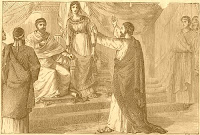Luther, Lewis, and “Little Christs”
Q: I understand that Martin Luther said, “Christians are ‘little Christs.’” I can believe that he did, and I agree with it. The implications are enormous. But a question remains: Can you provide a citation from Luther’s writings, sermons, etc.)? I keep searching and find many present-day references and quotations, but not a direct Luther quote.
 A: While the word “Christian” can itself mean “little Christ,” believers originally called Christ’s Church “the Way” (cf. Acts 9:2; 19:9, 23). They usually addressed each other as “brothers,” the “faithful,” the “elect,” or “believers.” Luke tells us that “in Antioch the disciples were first called Christians. (Acts 11:26)” It appears from semantics and sparse usage that the word “Christian” may have begun as derogatory term used by unbelievers for the followers of Jesus. Agrippa’s somewhat sarcastic words support such a contention: “Agrippa said to Paul, ‘In a short time would you persuade me to be a Christian?’ (26:28)”
A: While the word “Christian” can itself mean “little Christ,” believers originally called Christ’s Church “the Way” (cf. Acts 9:2; 19:9, 23). They usually addressed each other as “brothers,” the “faithful,” the “elect,” or “believers.” Luke tells us that “in Antioch the disciples were first called Christians. (Acts 11:26)” It appears from semantics and sparse usage that the word “Christian” may have begun as derogatory term used by unbelievers for the followers of Jesus. Agrippa’s somewhat sarcastic words support such a contention: “Agrippa said to Paul, ‘In a short time would you persuade me to be a Christian?’ (26:28)”In 1 Peter 4:15-16, the apostle indicated that even if the pagan world would use it as an insult, the believer should bear “Christian” as a badge of honor. He wrote, “Let none of you suffer as a murderer or a thief or an evildoer or as a meddler. Yet if anyone suffers as a Christian, let him not be ashamed, but let him glorify God in that name.” By the time of Ignatius of Antioch in the early 2nd Century AD, it was the normal term used — and a title for which many believers were willing to die.
From the Apostolic Church, we fast-forward to the 1500s and Martin Luther. One of his early books was The Freedom of a Christian (1520). In it, he wrote, “[A]s our heavenly Father has in Christ freely come to our aid, we also ought freely to help our neighbor through our body and its works, and each one should become as it were a Christ to the other that we may be Christs to one another and Christ may be the same in all, that is, that we may be truly Christians....
 “But alas in our day this life is unknown throughout the world; it is neither preached about nor sought after; we are altogether ignorant of our own name and do not know why we are Christians or bear the name of Christians. Surely we are named after Christ, not because he is absent from us, but because he dwells in us, that is, because we believe in him and are Christs one to another and do to our neighbors as Christ does to us. But in our day we are taught by the doctrine of men to seek nothing but merits, rewards, and the things that are ours; of Christ we have made only a taskmaster far harsher than Moses.”
“But alas in our day this life is unknown throughout the world; it is neither preached about nor sought after; we are altogether ignorant of our own name and do not know why we are Christians or bear the name of Christians. Surely we are named after Christ, not because he is absent from us, but because he dwells in us, that is, because we believe in him and are Christs one to another and do to our neighbors as Christ does to us. But in our day we are taught by the doctrine of men to seek nothing but merits, rewards, and the things that are ours; of Christ we have made only a taskmaster far harsher than Moses.”Luther’s understanding focused on what Christ does in and through the believer. Rather than making good works a condition for salvation, he shows that they are a result of being saved. Such an understanding gibes completely with Saint Paul, who wrote, “For by grace you have been saved through faith. And this is not your own doing; it is the gift of God, not a result of works, so that no one may boast. For we are his workmanship, created in Christ Jesus for good works, which God prepared beforehand, that we should walk in them. (Ephesians 2:8-10)”
Granted, the concept of each believer being a “little Christ” might be mined from these thoughts. However, it wasn’t until the 20th Century that the expression gained its most noted proponent. In Mere Christianity, C. S. Lewis several times used the term. Of the purpose of the Church, Lewis said that it “exists for nothing else but to draw men into Christ, to make them little Christs. If they are not doing that, all the cathedrals, clergy, missions, sermons, even the Bible itself, are simply a waste of time. God became Man for no other purpose.”
 Lewis spoke similarly of the believer. He wrote, “We shall love the Father as [Christ] does and the Holy Ghost will arise in us. He came to this world and became a man in order to spread to other men the kind of Life He has — by what I call ‘good infection’. Every Christian is to become a little Christ. The whole purpose of becoming a Christian is simply nothing else.”
Lewis spoke similarly of the believer. He wrote, “We shall love the Father as [Christ] does and the Holy Ghost will arise in us. He came to this world and became a man in order to spread to other men the kind of Life He has — by what I call ‘good infection’. Every Christian is to become a little Christ. The whole purpose of becoming a Christian is simply nothing else.”While Lewis certainly wouldn’t have argued with Luther, I think that he opened the door to allowing subsequent straying from the core of the Reformation understanding of justification by grace through faith in Christ. Mere Christianity doesn’t clearly specify when fully becoming a “little Christ” takes place. He doesn’t clearly state that only in the resurrection will we “love the Father” as completely as Jesus already does.
As far as I know, Lewis never believed otherwise. However, these quotes removed from their context could allow heretical interpreters to use him in support of a theology of glory and in defense of the possibility of moral and spiritual perfectionism occurring during this life.
 Meanwhile, although he was still developing his full understanding of God’s grace in Christ when he wrote The Freedom of the Christian, Luther already had a fairly mature grasp of the truth that the Christian is and remains simil iustus et peccator (both saint and sinner) as long as he lives. Therefore, he lauded and encouraged the believer’s Christ-presence in the world, directing the child of God to take care of his neighbor. However, he also warned and rebuked the same person because the Old Adam, stained by sin and Satan, still sought to do its own will, twisting God’s Word and taking advantage of his fellow man.
Meanwhile, although he was still developing his full understanding of God’s grace in Christ when he wrote The Freedom of the Christian, Luther already had a fairly mature grasp of the truth that the Christian is and remains simil iustus et peccator (both saint and sinner) as long as he lives. Therefore, he lauded and encouraged the believer’s Christ-presence in the world, directing the child of God to take care of his neighbor. However, he also warned and rebuked the same person because the Old Adam, stained by sin and Satan, still sought to do its own will, twisting God’s Word and taking advantage of his fellow man.In eternity, God will remove the final vestiges of sin. He promises that “the Lord Jesus Christ ... will transform our lowly body to be like his glorious body.... (Philippians 3:20-21)” At the same time, the need for us to be “Christs one to another” will be gone, for no one with whom we share eternity will be “hungry or thirsty or a stranger or naked or sick or in prison (Matthew 25:44)” So rather than continue idle speculation, we do better to confess our unworthiness, receive our forgiveness and our daily bread with thanksgiving, and love our neighbor as ourselves.
As a closing thought, I suggest you also read my earlier posts On Being Christ-Like and Christians in Society.
Luther quotes from Luther’s Works Volume 31, © 1957 by Fortress Press.
Lewis quotes from Mere Christianity, © 1952, 1980 by C. S. Lewis Pte. Ltd.
Scripture quoted from The Holy Bible, English Standard Version™, © 2001 by Crossway Bibles.
Send email to Ask the Pastor.
Walter Snyder is the pastor of Holy Cross Lutheran Church, Emma, Missouri and coauthor of the book What Do Lutherans Believe.
Technorati Tags: Martin Luther | C. S. Lewis | little Christs | simil iustus et peccator | Christ-like | Christian | Christianity | sanctification | Mere Christianity | The Freedom of a Christian | justification by grace through faith | Lutheran | confessional Lutheran | life

2 Comments:
Christianity originate from a true teaching with a twist.
thank you for this...I am studying Mt 10:24-39 and readin Bonhoeffers Cost of Discipleship.
I think of Isaac Watt's beautiful hymn: "Love so amazing, so divine, demands my soul, my life, my all."
Post a Comment
<< Home